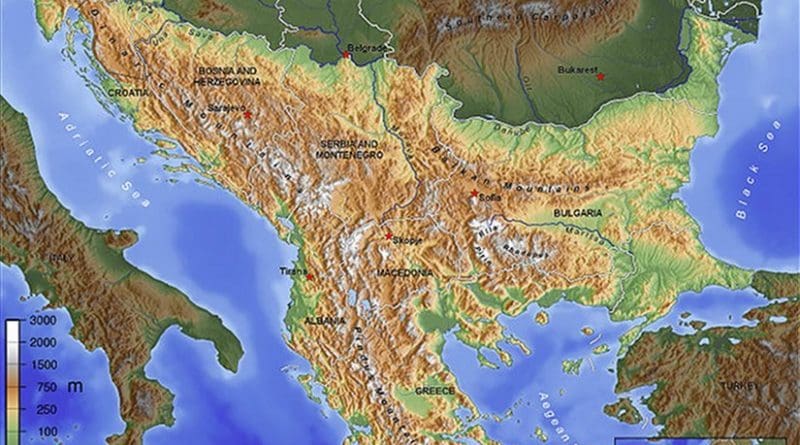Bosnia Leaders Hail Breakthrough Deal On EU, IMF
By Danijel Kovacevic
After almost a year of political quarrels, Bosniak and Bosnian Serb leaders on Sunday announced a major agreement on formation of an EU Coordinating Mechanism –a key condition for the continuation of the stalled EU accession process.
With that agreement in place, Bosnia’s Prime Minister, Denis Zvizdic and the Federation entity premier, Fadil Novalic, also signed the long delayed Letter of Intent for the IMF, paving the way for the new IMF program to be approved in the near future.
The breakthrough was reached at a meeting on Sunday in East Sarajevo of Zvizdic, Novalic, Bakir Izetbegovic – the chairman of the Presidency of Bosnia and leader of the Bosniak Party of Democratic Action, SDA – Milorad Dodik – president of Bosnia’s Serb-dominated entity, Republika Srpska, and leader of the Alliance of Independent Social Democrats, SNSD – RS premier Zeljka Cvijanovic and the head of the EU delegation in Bosnia, Lars-Gunnar Wigemark.
Wigemark called the meeting in an East Sarajevo restaurant in a last-ditch attempt to unblock the country’s EU path and an IMF arrangement, both stalled by months of political bickering.
During the meeting, Izetbegovic and Dodik signed an agreement that defined the most contentious issues related to the EU coordination mechanism, which has been blocked for years.
It was agreed that all decisions will be made by consensus and that all institutions at all levels will be obliged to ensure the presence of their representatives at meetings of the body.
All decisions adopted by the different bodies of the system of coordination mechanism may be reviewed by a higher authority in the system within ten days of their adoption and by representatives of the Council of Ministers [the state government], the RS government and the Federation government.
In addition to the agreement on the coordinating mechanism, the participants also signed the Letter of Intent for a new IMF program.
“Three issues related to the Coordination Mechanism were controversial, and all three were positively solved … as for Letter of Intent [with the IMF], it has already been signed and sent out to Washington”, Dodik said on Sunday after the meeting.
Dodik also said that the meeting had resolved contested issues regarding a blocked transport strategy, which – if true – would unlock EU infrastructure projects for Bosnia.
The IMF in July delayed approval of a three-year, 550-million-euros loan for Bosnia – even though all conditions for it had been met – because Zvizdic and Novalic refused to sign the Letter of Intent until the vexed issue of the Coordinating Mechanism was agreed.
The IMF put on hold a previous, 33-month program worth around 720 million US dollars because of delayed reforms, and it eventually expired in June 2015.
Bosnian Presidency chair Izetbegovic said the meeting had resolved the most contentious matters.
“Today we solved all the questions that will open Bosnia’s path to the EU and also to the IMF arrangement. This was a good meeting, which is definitely an introduction to all future questions,” he said.
“I wish to emphasize gratitude to Izetbegovic and Dodik and other members of the two delegations for their willingness to agree on matters related to the continuation of the European path. They showed statesmanlike maturity,” Wigemark said.
EU Commissioner for Neighbourhood Policy and Enlargement Negotiations Johannes Hahn also welcomed the breakthrough. “Looking forward to the next steps ahead on country’s EU path,” Hahn wrote on social networks.
However, Bosnian Croat leader Dragan Covic, who was not present at the meeting, sounded a more cautious note, welcoming the signing of the IMF letter but still expressing concerns about the Coordinating Mechanism.
He said that the last version that Izetbegovic showed him was “not acceptable” for Bosnian Croats, and he would have to see the document before Bosnian Croats accepted it.
Tanja Topic, a Bosnian political analyst from the Friedrich Ebert Foundation told BIRN, was also cautious.
“The only progress we ever witness is when this country needs money. Then we have a deal,” Topic said.
“It is difficult to say to what extent the deal is viable. Experience tells us it might be just another deal that ends in fiasco…. It also showed how powerful the entities are, and how weak the state is,” she added.
– See more at: http://www.balkaninsight.com/en/article/bosnia-leaders-hail-breakthrough-deal-on-eu-imf-08-01-2016#sthash.fHAmhRGH.dpuf

